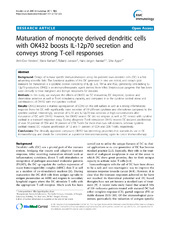| dc.contributor.author | Hovden, Arnt-Ove | en_US |
| dc.contributor.author | Karlsen, Marie | en_US |
| dc.contributor.author | Jonsson, Roland | en_US |
| dc.contributor.author | Aarstad, Hans Jørgen | en_US |
| dc.contributor.author | Appel, Silke | en_US |
| dc.date.accessioned | 2012-01-23T09:30:09Z | |
| dc.date.available | 2012-01-23T09:30:09Z | |
| dc.date.issued | 2011-01-05 | eng |
| dc.Published | BMC Immunology 2011, 12:2 | en |
| dc.identifier.issn | 1471-2172 | |
| dc.identifier.uri | https://hdl.handle.net/1956/5486 | |
| dc.description.abstract | Background: Design of tumour specific immunotherapies using the patients’ own dendritic cells (DC) is a fast advancing scientific field. The functional qualities of the DC generated in vitro are critical, and today’s gold standard for maturation is a cytokine cocktail consisting of IL-1b, IL-6, TNF-a and PGE2 generating cells lacking IL- 12p70 production. OK432 is an immunotherapeutic agent derived from killed Streptococcus pyogenes that has been used clinically to treat malignant and benign neoplasms for decades. Methods: In this study, we analysed the effects of OK432 on DC maturation, DC migration, cytokine and chemokine secretion as well as T-cell stimulatory capacity, and compared it to the cytokine cocktail alone and combinations of OK432 with the cytokine cocktail. Results: OK432 induced a marked up-regulation of CD40 on the cell surface as well as a strong inflammatory response from the DC with significantly more secretion of 19 different cytokines and chemokines compared to the cytokine cocktail. Interestingly, secretion of IL-15 and IL-12p70 was detected at high concentrations after maturation of DC with OK432. However, the OK432 treated DC did not migrate as well as DC treated with cytokine cocktail in a transwell migration assay. During allogeneic T-cell stimulation OK432 treated DC induced proliferation of over 50 percent of CD4 and 30 percent of CD8 T-cells for more than two cell divisions, whereas cytokine cocktail treated DC induced proliferation of 12 and 11 percent of CD4 and CD8 T-cells, respectively. Conclusions: The clinically approved compound OK432 has interesting properties that warrants its use in DC immunotherapy and should be considered as a potential immunomodulating agent in cancer immunotherapy. | en_US |
| dc.language.iso | eng | eng |
| dc.publisher | BioMed Central | eng |
| dc.rights | Attribution CC BY | eng |
| dc.rights.uri | http://creativecommons.org/licenses/by/2.0/ | eng |
| dc.title | Maturation of monocyte derived dendritic cells with OK432 boosts IL-12p70 secretion and conveys strong T-cell responses | en_US |
| dc.type | Peer reviewed | |
| dc.type | Journal article | |
| dc.description.version | publishedVersion | en_US |
| dc.rights.holder | Copyright 2011 Hovden et al; licensee BioMed Central Ltd. | |
| dc.identifier.doi | https://doi.org/10.1186/1471-2172-12-2 | |
| dc.subject.nsi | VDP::Medical disciplines: 700::Clinical medical disciplines: 750::Oncology: 762 | eng |

